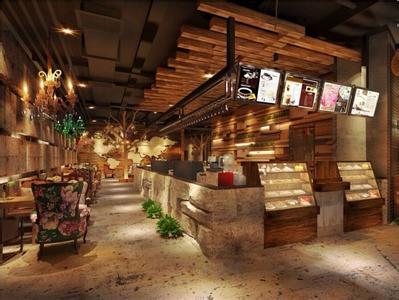Retailers in the economic downturn have become beneficiaries of closed cafes in Britain.
In the tide of shop closures, clothing stores have the highest closure rate. A total of 206 clothing stores closed in the first half of the year, but just over half of them opened: 119.
By contrast, there are more and more tobacco stores, jewellers and coffee shops.
The net growth of tobacco stores with a low base of stores reached 28, while jewellers increased by 26 stores. Costa, Britain's largest coffee chain, is the main driver of store growth: more than 1500 stores, more than double the number of stores in 2010. It is followed by a number of coffee chains such as Caffe Nero,Greggs,Pret A Manger, Starbucks and even McCafe.
It is understandable that clothing stores are closing down. In the general environment, the "economic downturn" has become a reason for retailers to close stores recently, especially after the "accidental" Brexit, the UK experienced a cold winter of retail and consumer confidence at rock bottom this summer. Compared with last year, consumers spent 700 million pounds less on clothes and shoes accessories.
Among the clothing stores, some stores were cleared and closed, while others turned online.
Banana Republic, owned by Gap alone, has closed nearly 75 stores worldwide because of a six-month decline in performance. Two weeks ago, Banana Republic announced that it would completely close eight stores in the UK and turn to online sales to save costs.
So why are there more and more retail formats such as cafes, tobacco shops, jewelry stores, which may not be able to do so, at a time when too many people are sad?
Vicki Stem, an analyst at Barclay Bank, points out that although the UK coffee market has grown over the past 15 years, per capita coffee consumption in the UK has not changed much. The rise of cafes is due to changes in spending habits.
"people who used to drink instant coffee at home or in the office are starting to patronize cafes," Stem said.
CEO Andy Harrison, the parent company of Whitbread,Costa, attributes the outbreak of cafes to the growth of female spending power and the popularity of online shopping-British stores close early and more people are likely to choose to shop at home at night than spending a day shopping on Saturdays, saving time to meet and chat with friends in cafes.
The cafe is a better social place for women than pub, which men prefer to visit: it is open all day and the environment is friendly to women and families.
Even, the coffee shop has replaced pub as the main social place for British people. This is because high alcohol taxes either dilute the profits of bars or make consumers disrelish the price of alcohol. This makes increasingly unsustainable bars want to make more money by selling coffee. JD Wetherspoons, a bar chain, plans to triple its sales of coffee and breakfast (yes, many British pubs also offer English breakfasts. )
In fact, British coffee brands have been developing local consumption habits since a long time ago, trying to incubate the country with the lowest per capita coffee consumption in Europe into the next market. When Costa opened stores across the British Isles, coffee makers knew that although they might not be able to elevate coffee to the status of tea, they did change consumers' spending habits.
All these reasons make the cafe the beneficiary of the recession. There are now nearly 20,000 cafes in Britain. Even in the worst parts of the UK economy, the coffee market has grown by 5 per cent.
As for the growth of tobacco stores, it is even more strange. It is true that the number of smokers in Britain is declining. A report from the smoking cessation group ASH also tells us that in convenience stores, the profit of cigarettes is only about 6.6%, while that of ordinary goods can reach 24.1%. In addition to maintaining the original cigarette volume to attract regular customers, convenience stores have no need to sell a few more cigarettes.
The only possibility is that more and more people smoke e-cigarettes.
According to the Independent, there are 2.6 million adults smoking e-cigarettes in the UK, and the number is growing.
Because of the demands and interests of smoking cessation organizations, the ASH report will selectively tell you the truth-they do not include e-cigarette data. Generally speaking, the profit of e-cigarette is as high as 30%, 35%.
According to Wired magazine, although medical scientists in the United States believe that e-cigarettes are harmful to health, a large medical institution in Britain believes that the harm of e-cigarettes far outweighs its benefits. smokers are also advised to switch to e-cigarettes early-after all, this is their best hope of quitting smoking.
In addition to reducing the harm of tar and secondhand smoke, an Spectator article also analyzed the appeal of e-cigarettes to device-obsessed players: like old-fashioned pipes, they can be held in their hands, and they are small things that can be compared and discussed among enthusiasts. It's just that it's not as retro as the pipe, and it's a little Geek.
Even, the coffee shop has replaced pub as the main social place for British people. This is because high alcohol taxes either dilute the profits of bars or make consumers disrelish the price of alcohol. This makes increasingly unsustainable bars want to make more money by selling coffee. JD Wetherspoons, a bar chain, plans to triple its sales of coffee and breakfast (yes, many British pubs also offer English breakfasts. )
In fact, British coffee brands have been developing local consumption habits since a long time ago, trying to incubate the country with the lowest per capita coffee consumption in Europe into the next market. When Costa opened stores across the British Isles, coffee makers knew that although they might not be able to elevate coffee to the status of tea, they did change consumers' spending habits.
All these reasons make the cafe the beneficiary of the recession. There are now nearly 20,000 cafes in Britain. Even in the worst parts of the UK economy, the coffee market has grown by 5 per cent.

Important Notice :
前街咖啡 FrontStreet Coffee has moved to new addredd:
FrontStreet Coffee Address: 315,Donghua East Road,GuangZhou
Tel:020 38364473
- Prev

A new coffee producer in the Colombian coffee town is in harvest season.
Angel Maria Orozco, a coffee grower with key cards, uses a pestle to peel off the hard shells of sun-dried coffee beans. Photo: Francesco La Stroch (Francesco Lastrucci) Coffee, however, is not native to Colombia, but it has been grown here for centuries, and the steep mountains are shaded by trees.
- Next

Starbucks' largest store is about to be settled in Shanghai. Are you ambitious in the Chinese market?
According to Japan's Asahi Shimbun, Starbucks plans to open a second such store in Shanghai next year, while it will open a third and fourth such coffee shop in New York and Tokyo in 2018. This kind of shop is named Starbucks Reserve Roastery (generally known as Buck Zhenxuan Coffee Roaster in Chinese, hereinafter referred to as roaster), customers can enjoy
Related
- Can I make coffee a second time in an Italian hand-brewed mocha pot? Why can't coffee be brewed several times like tea leaves?
- Hand-brewed coffee flows with a knife and a tornado. How to brew it? What is the proportion of grinding water and water temperature divided into?
- What is the difference between Indonesian Sumatra Mantinin coffee and gold Mantinin? How to distinguish between real and fake golden Mantelin coffee?
- What does bypass mean in coffee? Why can hand-brewed coffee and water make it better?
- Unexpected! Ruixing Telunsu lattes use a smoothie machine to foam milk?!
- % Arabia's first store in Henan opens into the village?! Netizen: Thought it was P's
- Does an authentic standard mocha coffee recipe use chocolate sauce or powder? Mocha Latte/Dirty Coffee/Salty Mocha Coffee Recipe Share!
- What is the difference between Vietnam egg coffee and Norway egg coffee? Hand-brewed single product coffee filter paper filter cloth filter flat solution!
- What is the difference between sun-cured and honey-treated coffee? What are the differences in the flavor characteristics of sun-honey coffee?
- How to make Italian latte! How much milk does a standard latte use/what should the ratio of coffee to milk be?

